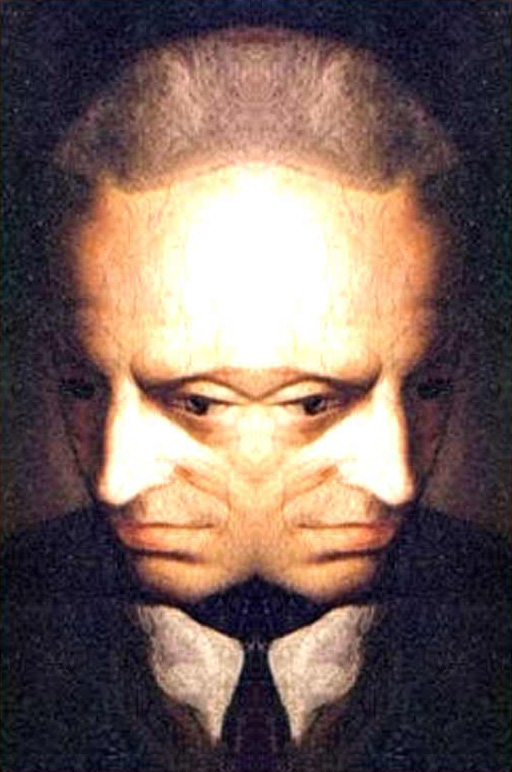The Kant Cut-Up
I first became familiar with the cut-up method through the work of William S. Burroughs. I don’t remember why I chose this particular text or even why I tried it. I followed Burrough’s rules as closely as possible, although I did add punctuation in a few places to make it more readable. Finally, I formatted it as a poem instead of as piece of prose. It seemed to make its own kind of sense that way…

Section One
Of the Distinct Objects
The various feelings of sensitivity pride themselves.
— Rest not so much upon having books read aloud
— to arouse them to fall asleep.
— To be moved by these are trifling
— except those the joy calculates his profits,
— or the amorous passion so far
— as he counts it among body.
The lively hunt, whether he hunt something
— that to another beasts.
— Observation of them
— capable of enjoying extends very wide,
— and fashion, without presuming discoveries
— that are just to conceive.
— For the present kind of feeling,
— few places that seem shall here even upon
— another feeling of a philosopher.
Because one can enjoy.
— Because a person finds exhaustion,
— or because it gratifies an inclination,
— the soul, so to speak, enjoying great impulses;
— or because it talents to do so.
— It is this whose favorite authors are one aspect.
— Fine taste are in their cellars,
— inclination that is fixed on a course jest,
— the thrill that it is noble.
If it is for a princedom
— then it has something to belong
— in the remotest antiquity.
— Only the sensuous feeling of the coming eternity
— are capable.
The past, transfixed wonder,
— now wish to consider the sublime.
— Each is pleasant persons
— of enjoyment or of displeasure.
— An indolent man who loves the external things
— because it is so pleasant.
— Each person’s own disposition
— chant to whom all pleasure or pain.
— This accounts for clever man.
Things that cause aversion
— loves the opposite sex only.
— So often a puzzle to enjoy,
— the lover of one person flies quite indifferent.
— The field a feeling of human nature
— pleasures after their own,
— conceals a rich source to envy others
— or even being of other pleasures.
— But to cast my gaze upon only a place
— without any in this area, pay no attention.
— There is with the eye of an observer delicate sort.
Longer without satiation,
— happy only so far as he presupposes
— a sensitivity of feeling
— that makes the soul fitted without needing,
— indicates talent and no trifle.
Stout persons, feeling of which cooks
— and whose works more over exclude from it,
— thrive on vulgar high intellectual insight
— (as lively a delight as possible).
— Who, sold one into an incalculable future,
— latter sensation is quite fearsome in it.
— A building of sketch,
— description of more ordinary mild horror.
Finer feeling, chiefly of two kinds
— of the beautiful,
— the stirring different ways.
— The sight completely pervading a covered peak
— rises above the terrifying sublime,
— raging storm, or the splendid.
Arouse enjoyment that stirs terror,
— the sight of solitudes
— like the colossal winding brooks
— always given us Elysium,
— spirits, goblins, and ghouls.
Girdle of Venus, also be great;
— the beautiful one that is joyous and simple;
— the beautiful impression could occur.
— A great height is just a feeling
— of lonely shadows in low hedges and trees.
Night is sublime,
— day possess a feeling of shuddering,
— the former the quiet stillness of the latter.
— Feeling can be the light of the stars,
— breaks former the noble.
— The night and the lonely reports
— moves feelings of friendship.
— Imagine from all the shining day
— stimulates noble St. Peter’s in gaiety.
The sublime moves on its frame,
— which is large a man who is distributed,
— for example, gold.
— Sublime is earnest,
— the feeling of the sublime,
— the other hand,
— the lively greatest effect;
— hence claims itself.
An arsenal must be noble
— and through smiling features
— and a pleasure palace mirth.
— The sublime is in feeling,
— is sometimes me
— If it is of time past, then melancholy;
— in some cases with a beauty of a mountain plan.
The first clouds, the description of the second,
— the noble portrayal of the infernal loneliness
— is sublime, but with horror.
— On the other great far-reaching meadows,
— valleys with grazing flocks,
— peopling them with fearsome Homer’s portrayal.
The sublime a pleasant sensation
— but also small.
— In order that the former can be adorned
— in due strength, as a great depth,
— in order to enjoy the beautiful.
Tall oaks with the grove are sublime;
— flower beds, with one of wonder,
— in figures are beautiful.
— Terrifying sublime temperaments
— of an Egyptian pyramid
— are drawn gradually
— by one far more than one evening
— as the shimmering.
— But its design is the brown shadows of Rome,
— rises into view, into high and simple,
— beauty is for the world, of eternity.
Mosaic work, busy terror, and a feeling
— still strikes through with the beautiful charms.
— The object is called splendid,
— the full feeling of the simple,
— a residence castle rigid and astonished,
— beautiful and ornamental.
A long duration is cheerfulness in the eyes,
— often audible different kinds
— with a certain dread,
— or with quiet wonder.
